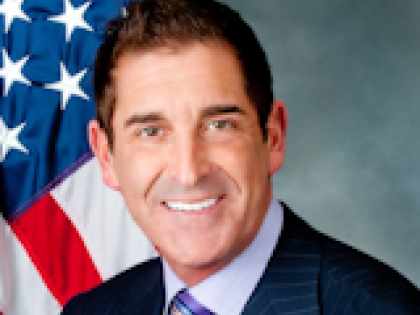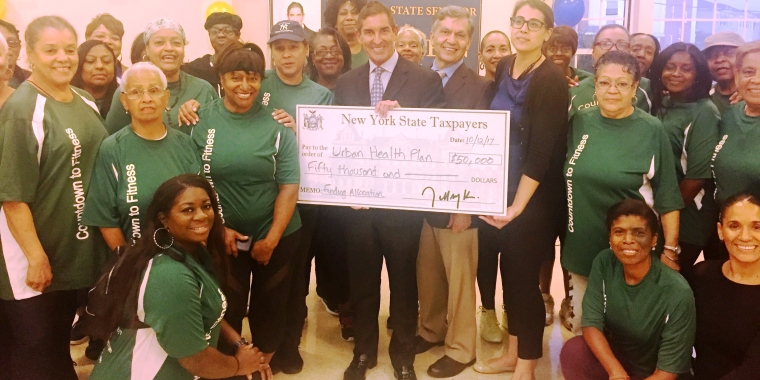
INDEPENDENT DEMOCRATIC CONFERENCE LAUNCHES SENIORS FIRST INITIATIVE
February 22, 2016
Unprecedented partnership with IDC, AARP, and numerous other statewide organizations to release Seniors First Survey of 4,500 New York seniors
QUEENS, NY - Independent Democratic Conference Leader Jeff Klein (D-Westchester/Bronx) and State Senator Tony Avella (D-Queens) on Monday joined leaders from New York’s senior organizations across the state, to launch the IDC Seniors First Initiative.
The members of Independent Democratic Conference released a report, the “New York 2020: Seniors First Initiative,” detailing the results of a quality-of-life and affordability survey taken by over 4,500 seniors and laying out the IDC’s proposals to help New York’s seniors comfortably live out their golden years.
The survey is the product of an unprecedented partnership between the IDC, the New York State AARP, the New York State Alliance for Retired Americans (NYSARA), the New York Statewide Senior Action Council, LiveOn New York, the Jewish Association Serving the Aging (JASA), Lifespan, Protectseniors.org, and the Association of Belltel Retirees.
“Each and every one of our seniors worked, raised families, contributed to their communities, and made New York State a better place. Now, as they enter their golden years, they deserve to live comfortably ,and independently. That is why I am proud that we created an unprecedented partnership with so many of New York’s senior citizen advocacy groups, to survey 4,500 seniors statewide and launch the Seniors First Initiative. Our comprehensive plan lays out multiple proposals to help keep our seniors in their own homes, help afford rising utility and heating costs, and help protect our seniors from financial fraud. With the Seniors First Initiative, it’s time for the State to listen to New York’s seniors, and put their needs first” said Senator Klein.
“To paraphrase a common saying, a society can be judged based on how it treats those who are most in need. There are many victims of New York’s rising costs, but, as this survey has shown, seniors in particular struggle to make ends meet. We must keep true to our commitment to senior citizens by ensuring that their quality of life does not suffer and that the issues they face in their later years are addressed and taken care of. While there may be no magic pill to treat this city’s affordability issues, we begin by finding solutions for those most affected. That is why I and all of the IDC will be prioritizing aid to our seniors in the coming years so that they can live out their retirement soundly,” said State Senator Tony Avella.
“It is vital that our seniors receive the support and care that they need. However, the Seniors First Survey paints a disturbingly different picture - with far too many of our seniors underprepared for the financial needs of their golden years. That is why I was proud to pass the SCRIE/DRIE raise, and why I am proud to introduce new proposals as part of the IDC’s Seniors First Initiative, such as the Work and Save program. With these programs, all of New York’s seniors will have the support they deserve,” said Senator Diane Savino (D-Staten Island/Brooklyn).
The survey paints an alarming picture, with 83 percent of seniors expressing that they do not believe New York State pays enough attention to their issues. Less than 17 percent are happy with the job their government is doing.
Other key findings detail the dire financial situation seniors face. The current population of New Yorkers age 65 and older is estimated at over 2.9 million and on the rise - with an estimated 4.4 million by the year 2040. While 69 percent of seniors are living on a fixed income, costs of living are drastically rising. Sixty-four percent of survey respondents have faced difficulty in paying their housing expenses, and a whopping 75 percent say that their utility costs are too expensive.
Disturbingly, 63 percent of respondents say that they are not confident their retirement savings are adequate to keep them financially stable.
The Seniors First Initiative consists of proactive legislative and program solutions to address the growing needs of New York’s seniors.
The IDC’s survey data shows that seniors are severely burdened by housing costs. Sixty percent of seniors are paying over $1,000 per month toward homeowner costs, 39 percent of seniors stated they sometimes, often or always have difficulty paying rent or homeowner costs on a regular basis, and 64 percent stated that their costs are too expensive.
The Seniors First Initiative would renew the income thresholds for SCRIE/DRIE and increase the income cap on SCHE/DHE, to ensure that senior homeowners and renters earning up to $50,000 per year have their rent frozen or are receiving property tax exemptions.
A mere 37 percent of New York’s seniors were confident about their retirement savings. The IDC would create the “New York State Secure Choice Savings Program,” a new state-run retirement savings program that would automatically enroll employees in a payroll deduction IRA, where employees do not currently offer a retirement plan.
New York’s seniors struggle with high utility costs. Of those surveyed, over 45 percent pay over $300 per month in utility costs alone. The burden is even greater for seniors over 65 years of age. Over 75 percent of seniors polled felt their utility costs were too expensive.
In addition to utility costs, rising costs of heat are leaving seniors struggling. The IDC proposes a State Heating and Energy Assistance Program, which would provide grants for heating costs to low- and middle-income seniors. The program would be funded at $50 million in the first year, which would serve 100,000 to 120,000 seniors.
Residents of 40 other states enjoy the protection of an independent Utility Consumer Advocate. Additionally, New York once had stronger consumer advocates who participated in the utility rate-setting process. Of those seniors surveyed, 90 percent would support the creation of a statewide Utility Consumer Advocate.
The Seniors First Initiative would establish the State Office of the Utility Consumer Advocate, to give consumers a seat at the table when it comes to utilities regulation.
The report revealed that seniors over 65 years of age have a 70 percent chance of requiring long-term care at some point in their later years. However, only 18 percent of seniors polled have long-term care insurance. Eighty-two percent lack long-term care insurance and will eventually have to make difficult decisions about how to afford long-term care.
Statistics show that individuals who invest in long-term care insurance tend to stay invested and continue to make payments. Currently, a 20 percent tax credit exists to incentivize those who purchase long-term care insurance. The IDC would enhance this credit to create a tiered system based upon age bracket, with those under 40 years old receiving up to 40 percent.
As the Baby Boomer generation ages, their wealth has become a target for financial exploitation and fraud. One in five senior citizens has been victimized by financial fraud, costing seniors $2.9 billion every year.
The IDC would establish a new set of tools to equip law enforcement to better protect seniors. The proposal would empower banks to refuse to disburse funds where there is reasonable belief that fraud has occurred, and to provide law enforcement and social services agencies with access to historical records or recent transactions relevant to any suspected financial exploitation.
Finally, the IDC believes that no family should have to decide between the income they need and providing for the care of their loved ones. In New York, much of the care that seniors receive is provided by family members. The IDC will continue to fight for Paid Family Leave in New York State. The IDC’s proposal would allow all employees to receive family care leave benefits for up to 12 weeks of employment.
“AARP strongly backs legislation to help New Yorkers save their own money for a financially secure retirement, support the invaluable work of family caregivers through paid family leave, provide utility consumers a strong and independent voice when rate hikes are on the table, expand and protect affordable housing and protect aging adults from financial exploitation. We thank Senator Klein, Senator Avella and the Independent Democratic Conference for proposing common sense solutions on these important issues, and we stand ready to work with them and their colleagues to enact legislation to achieve those goals,” said Beth Finkel, State Director of the New York AARP.
“The 440,000 members of the New York State Alliance for Retired Americans are pleased to have participated in the Independent Democratic Conference’s survey of senior citizens’ needs. Through the definition of a specific senior agenda leading to a productive discussion of the issues seniors face, we can arrive at solutions that support our seniors. We think that there are many good proposals in the conference’s package and are pleased that the IDC recognizes and supports paid family leave as a senior issue. The NYS Alliance for Retired Americans looks forward to a continued collaboration with the conference in order that seniors across the state are able to live with the dignity they have earned through many years of contribution to our society,” said Barry A. Kaufmann, President of the New York State Alliance for Retired Americans.
“On behalf of thousands of older New Yorkers struggling to afford their apartments, LiveOn NY thanks Senator Klein and the members of the IDC for this comprehensive package for seniors. We believe the $50,000 income level for SCRIE and DRIE must be made permanent. Almost 100,000 older adults in NYC pay more than 50% of their income in rent. SCRIE allows older adults to be able to afford to remain in their homes and prevents eviction. With an astounding 260,000 older New Yorkers experiencing elder abuse that goes unreported, LiveOn NY strongly supports enacting legislation that establishes a protocol for banks to disclose information on suspicious transactions to adult protective services and District Attorney offices in a timely manner, to stop the bleeding of a senior's finances,” said Bobbie Sackman, Director of Public Policy for LiveOn NY.
“According to NYS Elder Economic Insufficiency Report, 58 per cent of older New Yorker households are not making ends meet.* It is time for New York to make adjustments to its infrastructure and the programs available to its older residents. In 15 short years, one in four New Yorkers will be 60 years of age or older. Studies show that this population will be more ethnically diverse, female, and live longer with lesser resources, educational attainment, and English proficiency. The IDC's survey results are consistent with the onset of this trend. This is the time for legislators and the community to work together in devising a corrective action plan that would preserve the standards of excellence that New York State upholds in its social services and quality of life,” said Maria Alvarez of the New York StateWide Senior Action Council.
